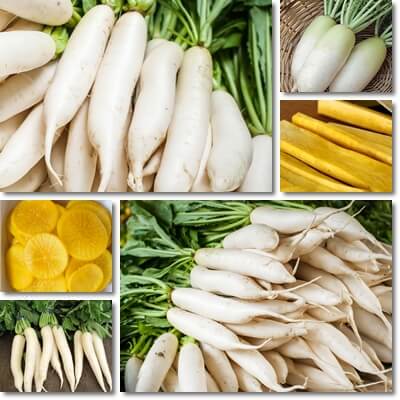Daikon radish is the perfect seasonal addition to your winter tablescape. The radish variety is snow-white and thus color coordinates perfectly with the traditional winter wonderland aesthetic that we dream up during the holidays. But there are many more pragmatic reasons to eat Daikon radishes than just aesthetics. For instance, the root vegetable is a source of organic sulfur compounds with scientifically proven anticancer properties.
Not only this, but it’s a good source of vitamin C, potassium and magnesium with anti-inflammatory benefits and benefits for high blood pressure.
What is Daikon radish?
The Daikon radish, also known simply as Daikon, is a variety of white radish popular in Chinese and Japanese cuisine in particular, but commonly eaten throughout all of East and South Asia. It is also known as the Japanese radish, the Chinese radish or Oriental radish and, in India and South Asia, as mooli. Other common names include winter radish, white winter radish or long white radish.
In non-culinary contexts, Daikon is called an oilseed radish, fodder radish or tillage radish, depending on whether it’s used as animal feed or as an overwinter fallow crop to counteract soil compaction. The reason it’s classified as a winter radish, despite being available almost year-round, is because it was originally in season late fall through winter. In any case, winter Daikon has the best taste.

What does Daikon radish look like?
All true Daikon radishes have snow-white flesh and skin, but other than this appearance may differ between the different varieties. The most popular type of Daikon radish is the Japanese Daikon which is a cultivar with a long, white, tapering root that looks very much like a long white carrot. The Sakurajima Daikon is a cultivar of the Japanese Daikon, essentially a turnip-shaped giant Daikon radish that typically grows to 5-10 kilograms but is known to reach up to 30 kilograms.
Chinese varieties are often somewhat shorter and stouter. There is also an heirloom Chinese Daikon radish variety with light green skin and watermelon-pink flesh called the ‘watermelon radish’ or ‘Chinese daikon’.
Size, length and girth, and shape may vary significantly between the different types of Daikon radish. The way the vegetable looks may also be impacted by factors such as age of the root at harvest time, planting season, amount of rainfall, soil compaction, region of cultivation and more. So some roots may be longer and slimmer, while some shorter and stouter, some larger, some smaller etc.
What does Daikon radish taste like?
Raw Daikon radish is crisp and juicy, mild-tasting, faintly sweet, and only very slightly pungent. Cooked Daikon is soft and tender, with a similarly mild, sweet and lightly pungent taste, but not very flavorful. Overall, the variety is less pungent and less spicy than the more common red radish. The younger roots are more tender and lightly flavored, sweet even, while the older roots are tougher, sometimes woody even, and more pungent. Growing conditions can impact taste quite significantly.
For example, drought makes Daikon radishes spicier, while radishes from a winter harvest are sweeter (the best season for Daikon radishes is December to February). Some roots can even taste bland under certain conditions. You can eat both Daikon roots and greens. The leafy green tops are peppery and even somewhat bitter, but their pungency gets toned down by cooking.

Daikon radish nutrition facts per 100 g, cooked:
- Energetic value: 38 kilocalories/calories
- Carbohydrates content: 3.3 g
- Sugar content: 1.8 g
- Fiber content: 1.5 g
- Protein content: 0.67 g
- Fat content: 2.6 g
- Water content: 92.5 g
Vitamins in daikon radish:
- Vitamin A: 11 mcg (micrograms)
Minor source of beta-carotene, lutein, zeaxanthin. - Vitamin B1: 0.011 mg
- Vitamin B2: 0.036 mg
- Vitamin B3: 0.234 mg
- Vitamin B5: 0.138 mg
- Vitamin B6: 0.078 mg
- Vitamin B9: 21 mcg (micrograms)
- Vitamin B12: 0 mcg
- Choline: 6.5 mg
- Vitamin C: 12.2 mg
- Vitamin D: 0 mcg (micrograms)
- Vitamin E: 0.03 mg
- Vitamin K: 3.6 mcg (micrograms)
Minerals in daikon radish:
- Calcium: 25 mg
- Copper: 0.048 mg
- Iron: 0.33 mg
- Magnesium: 10
- Manganese: 0.038 mg
- Phosphorus: 20 mg
- Potassium: 226 mg
- Selenium: 0.6 mcg (micrograms)
- Sodium: 160 mg
- Zinc: 0.27 mg
What are the benefits of Daikon radish?
Good for weight loss
Daikon radishes are very low-calorie: only 18 kcal/100 g (raw) and 38 kcal/100 g (cooked). The variety is very low-fat, low-carb and low-sugar, making it a good food to eat if you are looking to lose weight.
Benefits for high blood pressure
Including Daikon radish in your diet is a great way to get potassium and magnesium needed to bring down blood pressure numbers. A serving of 100 g of Daikon radish provides about 5% of the recommended daily intake of both potassium and magnesium for an average adult.
Benefits for digestion
Eating Daikon radish helps stimulate digestive juices and bile flow, producing a beneficial effect on digestion. In traditional Japanese cuisine, pickled Daikon radish is used as an after-meal digestif. Pickled Daikon is also a prebiotic and prebiotic, helping feed and enrich good gut bacteria populations.
Anti-inflammatory properties
Daikon radishes are a good source of vitamin C which studies show has anti-inflammatory action. According to research, vitamin C lowers levels of several inflammation markers in the body such as C-reactive protein, contributing to anti-inflammatory benefits.
Good for healthy teeth and gums
Vitamin C deficiency causes scurvy, a disease that affects blood vessel integrity and causes, among other symptoms, bleeding gums and loss of teeth. Raw Daikon is a good way to get vitamin C during winter months as it’s a winter seasonal food available December through February. Other foods in season that are good sources of vitamin C are cabbage, cauliflower, turnip, rutabaga and parsnip.
Benefits for skin
With close to 30% of the recommended intake of vitamin C per 100 g, Daikon radishes help boost collagen production in the skin for fewer wrinkles. Collagen ensures skin integrity and skin elasticity, helping delay wrinkles and maintain skin looking younger longer.
Benefits for constipation
If you are experiencing constipation, upping your intake of fruits and vegetables can help regulate transit and relive constipation naturally. Seasonal winter vegetables such as Daikon radishes, turnips, parsnip, carrots and more provide soluble dietary fiber to help soften stools and promote easy, regular bowel movements. Potassium in Daikon radishes also helps coordinate muscle activity through its electrolytic properties helping move food along the digestive tract.
Benefits for pregnant women
Pregnant women eating raw or cooked Daikon radish get good amounts of vitamin B9. Studies show vitamin B9 contributes to the normal development of the baby during pregnancy and helps prevent neural tube defects of the brain, spine and spinal cord.
Helps combat fatigue
Daikon is a source of several B vitamins (B1, B2, B3, B5, B6, B9) and iron needed for red blood cell production and energy metabolism. The seasonal winter radish has good amounts of potassium and magnesium which support muscle function and combat muscle weakness, aches, pain, cramps and spasms, and is also a good source of vitamin C to boost iron absorption.
Benefits for diabetics
Daikon is a low-glycemic food with a glycemic index (GI) score of less than 50. Because it is low-glycemic, it does not cause spikes in blood sugar, contributing to better blood sugar control in diabetes.
Anticancer properties
Glucosinolates are sulfur-based compounds that occur naturally in many foods such as Daikon radishes, black radishes as well as black radish juice, but also cabbage, cauliflower, broccoli, horseradish, mustard, wasabi and more. Studies show glucosinolates produces metabolites called isothiocyanates with scientifically proven anticancer properties. Isothiocyanates have anti-inflammatory, free-radical scavenging and antimutagenic effects and are known to induce phase II detoxification enzymes.
What are the side effects of Daikon radish?
Daikon radish is generally recognized as safe for consumption and side effects are rare and, for the most part, caused by an excessive intake.
Daikon radish side effects may include:
- Allergic reactions. This is a rare side effect. Seek medical help immediately if you experience any symptoms of an allergic reaction such as a skin rash, swelling of the lips, tongue or throat, coughing, wheezing, hoarseness, difficulty breathing, low blood pressure, dizziness or confusion.
- Digestive upset. Eating too much Daikon, especially if pickled, can have an irritating effect of the stomach lining and produce stomach upset.
- Low blood sugar levels. Diabetics on medication should consume Daikon and other radishes in reasonable amounts to prevent hypoglycemia, that is, blood sugar levels that are too low.
- Underactive thyroid. Eating excessive amounts of Daikon radish can cause an underactive thyroid (hypothyroidism) as a result of isothiocyanates produced from glucosinolates in the root (e.g. myrosinase) blocking iodine absorption by the thyroid.
